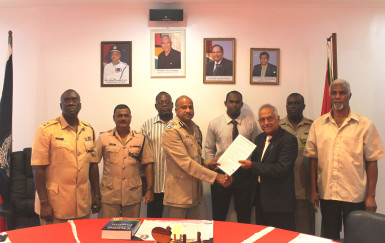Guyana Bar Association (GBA) President Christopher Ram on Wednesday presented copies of the “Rights of Arrested Persons” to the Guyana Police Force (GPF).
The presentation was made to Commissioner of Police Seelall Persaud, in the presence of other senior officers of the police force, in the Commissioner’s Conference Room at Police Headquarters, Eve Leary, according to a statement issued by the GPF.

Persaud, the statement said, indicated that the documents will be placed at conspicuous locations in the Enquiries Office at various police stations for the information of the public and as reminders to police ranks as well, which will assist in the quality of service delivered to the public.
Ram, who handed over the laminated documents to Persaud, stated that the GBA is committed to the improvement of general conditions in Guyana, including ensuring that justice is better served. He added that the GBA recognised the tremendous work being done by the police force and that it stood available for any necessary assistance.
Persaud said the donation was the result of an earlier positive engagement with the GBA and he voiced his gratitude for its timely delivery.
RIGHTS OF ARRESTED PERSONS
1. To be informed as soon as is reasonably practicable, in a language that he understands, of the reasons for his arrest;
2. To be permitted, without delay, to communicate and consult, in person or by telephone, with an attorney-at-law;
3. To be told in a language he understands, that he has a right to remain silent and if he chooses to speak, that it can be put in writing and given in evidence against him;
4. Not to be forced to make a confession or to make any admission. Any admission or confession may be used against the arrested person.
5. Save in exceptional cases, no question may be put to an arrested person after he has been charged or has been informed that he may be charged;
6. To be charged and released either on warning or on bail, unless there is good reason to be kept in the lock-up;
7. To be taken to court or released within 72 hours of his/her arrest unless an extension of stay in Police custody is granted by a Judge.





